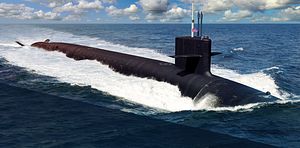Twelve missile tubes built for the U.S. Navy’s future Columbia-class of nuclear-powered ballistic missile submarines (SSBN) are being scrutinized for substandard welds, possibly indicating a significant quality control issue in the Navy’s ambitious SSBN acquisition program designed to replace 14 older Ohio-class SSBNs by the 2030s.
The substandard welds, manufactured by BWXT, Inc., a sub-contractor to General Dynamics Electric Boat (GDEB), the primary builder of submarines for the U.S. Navy, might require time-consuming and costly fixes. The issue affects not only the future Columbia-class, but also Block V Virginia-class nuclear-powered attack submarines (SSNs) and the U.K.’s Dreadnought-class of SSBNs as the missile tubes are part of the common missile compartment shared by all three submarine classes.
Defense News first reported the problems on August 6.
“All BWXT welding requiring volumetric inspection has been halted until the investigation is complete,” according to a statement from Naval Sea Systems Command. “Initial reports indicate that the other vendors do not have the same issue, and they continue to produce missile and payload tubes.”
The U.S. Navy intends to operate a fleet of 12 Columbia-class SSBNs with construction of the first-of-class USS Columbia expected to begin in 2021. The first Columbia SSBN is slated to be delivered to the Navy in 2028. Beginning in 2031, the new class is scheduled to begin replacing Ohio-class SSBNs on a rolling basis. It is unclear whether the substandard welds will impact the overall construction timeline and induction schedule.
A Naval Sea Systems Command spokesperson quoted by Defense News denies that the setback will affect the overall schedule: “The Navy purposely planned for early construction of the Common Missile Compartment including missile tubes and first article quad pack, to mitigate risks such as these, and construction start for Columbia remains on schedule in FY2021.”
GDEB, which was awarded a $5.1 billion contract to undertake detailed design work for the new Columbia-class in September 2017, is currently investigating the quality control problem, according to a press statement.
“General Dynamics Electric Boat is investigating a weld issue identified by one of its subcontractors on missile tubes delivered to GDEB for use in the U.S. COLUMBIA and UK DREADNOUGHT SSBN programs and payload tubes for the VIRGINIA Class SSN program,” GDEB said in a statement.
“GDEB is working closely with the subcontractor and the Navy to mitigate any potential impacts to these programs. As our customers expect the best from us, safety and quality are central to the culture at General Dynamics Electric Boat.”
Purchasing the missile tube assemblies in advance was supposed to help trim the cost of what already will be the U.S. Navy’s most expensive submarine acquisition program. It is unclear to what degree the weld issue will drive up costs. As I reported elsewhere, total lifetime cost for the new class of SSBNs is already estimated at around $100 billion.

































